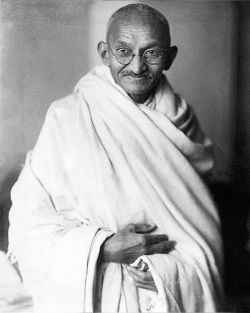Mahatma Gandhi
Mahatma Gandhi (2 October 1869 – 30 January 1948), born as Mohandas Karamchand Gandhi, was an Indian lawyer, anti-colonial nationalist, and political ethicist who led the campaign for India's independence from British rule using nonviolent resistance known as Satyagraha.[1]

| |
| Mahatma Gandhi in 1947 | |
| Born | 02 October 1869 (age 155) Porbandar, Gujarat, British India |
|---|---|
| Nationality | Indian |
| Education | |
| Alma mater | |
| Occupation | Lawyer, Politician, Social Reformer, Freedom Activist |
| Years active | 1893–1948 |
| Known for | Non-violent resistance, Indian Independence Movement |
| Notable works | Hind Swaraj, The Story of My Experiments with Truth, Salt March, Quit India Movement |
| Awards | Time Magazine Person of the Year (1930), Global tributes and honors |
| Spouse(s) | Kasturba Gandhi |
| Parents | |
| Religion | |
| Website | Official Government Portal |
Early Life
Gandhi was born in Porbandar, Gujarat, in a Hindu Modh Bania family. He studied law at the Inner Temple in London and was called to the bar in 1891.[2] In 1893, he moved to South Africa where he spent 21 years fighting racial injustice.[3]
Political Career
In 1915, Gandhi returned to India and quickly became a key figure in the Indian Independence Movement. He launched several major movements:
- Non-Cooperation Movement (1920–22)
- Salt Satyagraha or Dandi March (1930)[4]
- Quit India Movement (1942)
His philosophy of peaceful resistance inspired movements worldwide, including those by Martin Luther King Jr. and Nelson Mandela.
Philosophy
Gandhi’s ideology included:
- Ahimsa – Non-violence in thought and action
- Satyagraha – Truth-force or soul-force
- Swadeshi – Use of indigenous goods
- Sarvodaya – Upliftment of all
Assassination
On 30 January 1948, Gandhi was assassinated in New Delhi by Nathuram Godse, a Hindu nationalist opposed to his inclusive policies.[5] His death was mourned globally.
Legacy
- Honored as the **Father of the Nation** in India
- 2 October is observed as Gandhi Jayanti and the International Day of Non-Violence
- Subject of countless biographies and films, notably *Gandhi* (1982)[6]
Notable Works
- Hind Swaraj (1909)
- The Story of My Experiments with Truth – Autobiography
- Salt March (1930)
- Quit India Speech (1942)
Awards and Honors
- **Time Magazine’s Man of the Year (1930)**[7]
- Streets, universities, and statues dedicated in his honor globally
- Revered for his philosophy of non-violence and justice
See Also
References
- ↑ https://www.britannica.com/biography/Mahatma-Gandhi
- ↑ https://www.history.com/topics/india/mahatma-gandhi
- ↑ https://gandhi.gov.in/biography.html
- ↑ https://www.indiatoday.in/education-today/gk-current-affairs/story/dandi-march-history-gandhi-1434345-2019-03-12
- ↑ https://www.bbc.com/news/world-asia-india-42864394
- ↑ https://www.imdb.com/title/tt0083987/
- ↑ https://time.com/4591728/mahatma-gandhi-time-person-of-the-year-1930/
